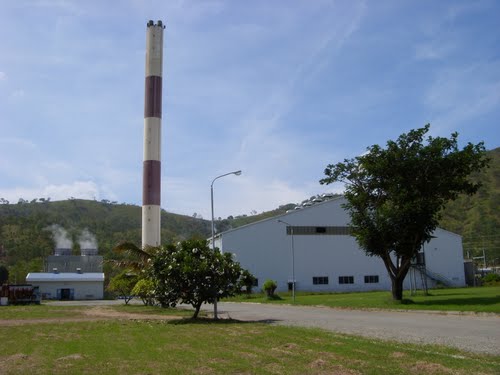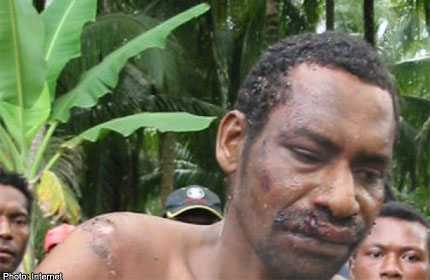By Mariël Lancee
I am writing this blog in English because I want the whole world to know about this deceiving travel agent based in Mt. Hagen in Papua New Guinea.
After living for 2 ½ years Port Moresby in PNG it was time I discovered a bit of the remote areas in this country. Until then I had only visited various tropical islands which was a very nice experience. For going to remote areas, I decided to do a Sepik tour with a friend and found online the travel agent Niugini Eco Tourism Services: http://www.png-tourism.com/. A very nice website and easy to find the trip you want. We chose the adventurous ‘Upper Sepik River Tour’.
On 18 February 2013 I asked them for a price quote and the email correspondence with Daniel Stanley went very smooth. On 19 February I told Daniel we wanted to be sure to be booked in the In Wewak Boutique Hotel, because we heard from other people that the other hotels/guesthouses were of poor quality (in the trip itinerary they promote on the website, you spend the first and last night in this beautiful hotel). Daniel answered positively the same day. The next day Wednesday 20 February I did the payment of 8840 kina for two persons (= € 3.322,00 / US$ 4.194,00 / AUS$ 4110,00) and sent them a copy of the deposit slip.
After that I didn’t hear anything from Niugini Eco Tourism Services. On Tuesday 26 February I sent Daniel an email with the question if all the bookings were confirmed. No answer. Then I got a bad feeling and started googeling and what a shame! All over the internet this travel agent with the owner Ben Nickintz / Ben Nikints was mentioned as a scam/fraud etc. The scam already started before 2006: tourists from USA/Europe arrived in Wewak and the In Wewak Boutique Hotel was not booked. They ended up in a rundown cheap guesthouse or they had to pay again for a room. And that is something you don’t want in PNG, because it is not an easy country to travel in.
After reading the stories on the web, I called the In Wewak Boutique Hotel. They informed me that: “due to outstanding bills, they cannot accept any booking of Niugini Eco Tourism Services anymore”.
I went to the bank and see if could undo the payment; the branch manager of the bank in Mt. Hagen contacted Ben Nickintz, the owner of the travel agent and the account. Nickintz told him before doing a refund, he first wanted to talk with us. As he did not contact me, I sent an email to Daniel that I would like to cancel the booking and was looking forward to a refund as soon as possible. He answered me that we would get a refund according the terms and conditions of cancellation. This was pretty strange because he sent me a link which cannot be found on their website, nor was it working in the link which was added to the invoices.
I sent Ben an email in which I asked him for a 100 % refund, because he didn’t yet make any costs on behalf of us. This was part of his answer:
“We have been sending tourists to Boutique hotel in numbers over 100s. We owe them only a K1200-K1300. I’m not sure of the exact amount which we accidently paid into a wrong account. After recouping the money from the bank we did not pay into their account again due to xmass and New year holidays where I was abroad. Now they are labeling us as some kind of criminals. This is very funny. My staff Daniel has been emailing them for the outstanding invoice and no one at the hotel has been responding…… I am pretty sure you will not get your full refund but certain percents as indicated in the booking guidelines”.
I answered him that I disagreed with the explanation of the refund because we explicitly asked for this hotel before paying the bill. The reason for not booking this hotel is his responsibility and not ours. Further, I told him if I didn’t have proof that the money was refunded before Tuesday 9.00 am, I would use all my contacts in PNG to expose the unfair practices by him and that this would have all the publicity consequences a tourist operator in PNG does not wish.
Yesterday morning I got another email from Ben, part of the email:
“My understanding is that you cancelled this trip within that 14 days prior
to tour commencing days. You cancelled the tour on the 28th Feb 2013 which
means that you cancelled the tour 10 days before the tour actually started.
This now means that you have to come on this tour at all cost or you will
loss 100% of the payment. I will do my best to book you two at Wewak
Boutique Hotel. I will also put all my best effort to ensure Cyril offers
you the best tour in Sepik River. I will also ensure extra security measures
are in place. This I will do at no additional cost.
After the tour if you are dissatisfied I promise you I will make a 50%
refund. I think I am being fair on you with these propositions. Please
revert to me asap on this matter so I can start making all the land
arrangements”.
Promises, promises, he probably cannot make, because clearly the In Wewak Boutique Hotel doesn’t want to do business with him anymore (which I understand).Our husbands sent him another mail today with the request to refund the money:
“Two European women travelling to the Sepik is not an easy trip and should from the beginning feel good. After having read some of the e mail correspondence between my wife, Daniel and you we do not feel comfortable that this trip will be made in the conditions wished. I kindly ask your cooperation in cancelling this trip and as a gesture of your good intentions reimburse the amount for which you have not yet committed costs”.
After 7 years abroad in less developed countries and at least a hundred bookings on the internet, for the first time I am a victim of a scam. I feel deceived and can’t forgive myself for not checking the internet before payment. On the other side, I am lucky that I live in Port Moresby and could easily contact the hotel and of course we are not going. Imagine (as quite a lot of tourists unfortunately already experienced), you come from the USA or Europe after 30 hours of travelling and nothing is booked.
As Ben did not pay the refund today I will take further steps. I will do anything within my reach to get my money back. Nature wise PNG is one of the last pearls on earth. The PNG Tourism Promoting Authority is trying to get more tourists to this country. But as there are not many travel agents in PNG who organize this kind op trips, I think they first have to get rid of fraudulent deceiving persons like Ben Nickintz / Ben Nikints.
If, after reading this, you still want to book with Niugini Eco Tourism Servcis, please read the links below. He already had a few businesses under different names, but every time the same owner Ben Nickintz / Ben Nikints. Unfortunately we were not the first and probably not the last people who got deceived. Be aware, he is operating under different names all leading to the same website: http://www.png-tourism.com/. Don’t book on this site! As soon as we got our money back, I will remove this blog.
Read here the stories of other victims of Niugini Eco Tourism Services:
- http://www.tripadvisor.com/ShowTopic-g294115-i3592-k3734064-Benjamin_Nikints_or_Sam_Obedi_Wanted_for_Fraud_in_PNG-Papua_New_Guinea.html
- http://www.topix.com/forum/au/brisbane/T5JCA2EGA10IMFVUU
- http://www.tripadvisor.com/ShowTopic-g294115-i3592-k5822518-Nuigini_Eco_Tours-Papua_New_Guinea.html
- http://www.tripadvisor.com/ShowTopic-g294115-i3592-k639067-PNG_Holidays_BEWARE_of_tour_operator-Papua_New_Guinea.html




















